***THIS SECTION IS REGULARLY UPDATED**
Policy Resolutions or Rules and Regulations, as described in the Rockland Village HOA Declaration, are the rules and regulations of the Association, and are adopted by the Rockland Village HOA Board of Directors. Their purpose is to clarify or supplement provisions of the governing documents. The Board may amend these Rules and Regulations from time to time as the Board carries out its management of the Association. The Design and Maintenance Standards and Parking Policy are examples of the types of Rules and Regulations.
Homeowners, tenants, guests and other occupants are all responsible for following the Rules and Regulations of Rockland Village HOA. However, it is ultimately the homeowners’ responsibility to make sure that their tenants, guest and other occupants understand and abide by these Rules and Regulations since the homeowner will be the responsible party if violations occur and fines are levied.
Please take a moment to read the Rules and Regulations listed on this page. They serve to improve the quality of life and the standard of living for everyone in Rockland Village.
RULES AND REGULATIONS
The Board and Management will make every attempt to give warning notices to homeowners and/or their tenants regarding violations. However, habitual violations of the standards and policies set forth in the Association’s HOA documents and the Rules and Regulations will result in a hearing and fines. Parking violations may result in an immediate tow. If you have questions regarding the rules and regulations, please refer to our FAQ page.
Community Design & Maintenance Standards
Rules and Regulations for the design and maintenance standards will have its own separate section since it includes important and detailed information directly from our HOA documents. In summary, these standards are put into place to make sure homeowners keep up on the exterior design, repairs and maintenance of their property. Proper repair and maintenance keeps your property from developing further or accelerated damage. In many cases, it also prevents neighboring properties from being damaged as well.
Property Inspections
Regular inspections of your property and exterior of your home is performed by the association and if there are any outstanding repair or maintenance issues a letter will be sent to the property owners with a deadline to address the issues. To see required colors, materials, and other design & maintenance standards:
CLICK HERE TO GO TO PROPERTY INSPECTION PAGE
Vehicles and Parking
Each townhome and single family home in Rockland Village has a two car driveway in addition to a two car garage. No more than two cars may be parked in each driveway. Cars may not obstruct the walking paths or extend onto the street. This impedes foot traffic and vehicle traffic. Cars may not obstruct grassy areas. This prevents maintenance work and damages landscaping, even during dormant winter months.
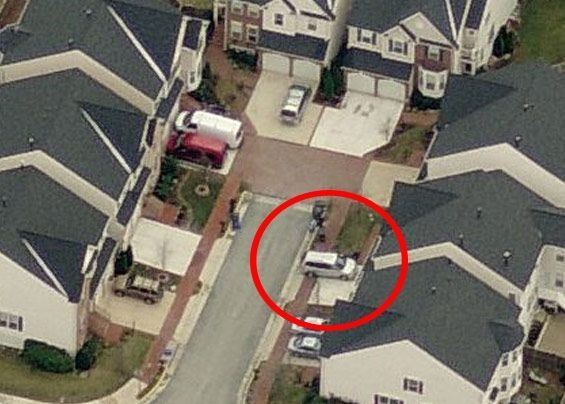
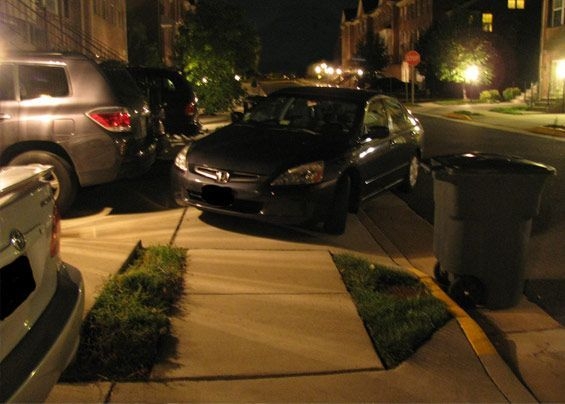
but more importantly, it is also obstructing street traffic. Parking violations that obstruct other
drivers or cause a safety hazard may result in an immediate tow.
Additional cars may be parked in overflow parking spots within the community. No more than one car per house may park in overflow. There is also street parking when available on Elmwood Street and Dallas Street.
When parking your vehicle in overflow parking spots, please make sure you are within the parking lines. Parking space is limited and parking on or across the parking lines is a towable violation.
For community members who own commercial or oversized vehicles; please refer to the HOA documents to determine if your vehicle may be parked or stored in your driveway or common area. Most commercial vehicles create an obstruction and should not be parked or stored in overflow parking spaces or driveways. However, these types of vehicles are welcome within the community while they are performing services.
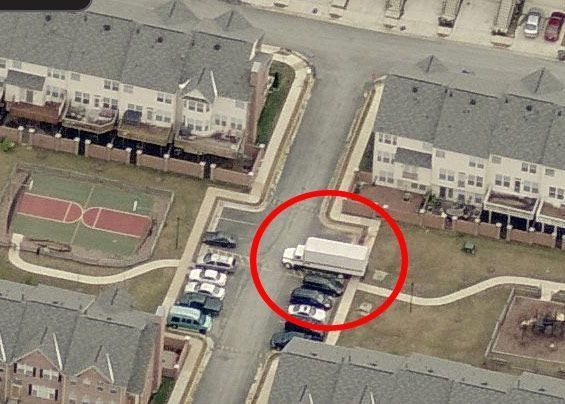
Pets and Pet Waste
For the sake of your pet’s safety and the safety of other people and animals, please make sure that if you walk your pet in the community, it is properly secured with a leash or halter.
Please make sure to clean up after your pet whether it’s your front lawn, a neighbor’s lawn or common property. Pet waste attracts pests and is a bio-hazard. Pet waste that is left on the ground seeps into the soil and damages landscaping or gets washed into our storm retention pond, creating an unpleasant environment for homeowners who live nearby.
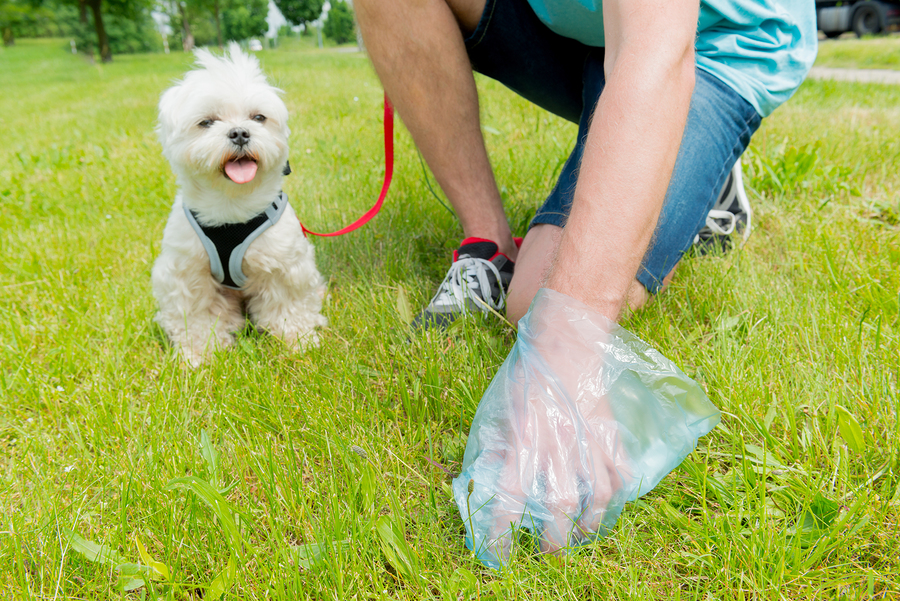
Trash Cans & Recycle Bins
Trash cans and other refuse containers are to be left out on the curb no earlier than the night before scheduled pick-up.
Currently, the scheduled pick-up falls on Monday and Thursday mornings.
Trash cans and other refuse containers must be removed from the curb and stored out of view before the following Tuesday or Friday morning. This allows everyone enough time to leave their refuse out on the curb the night before pick-up and also allows enough time for everyone to bring in the containers on the evening of pick-up days.
This prevents obstruction of sidewalks, streets and driveways. But more importantly, it reduces health & safety risks. Trash containers, even if they are empty, attract wild animals and are a contamination risk to children or adults who come in contact with them.
Leaving the trash containers out on the curb also exposes them to damage by strong winds, cars or vandals.
Please keep your trash containers, recycle bins and other refuse containers off the curb on non pick-up days.
Garbage and Littering
Trash must be properly contained and secured when left out for pick up. Poorly secured trash frequently gets scattered throughout the community by strong winds or wild animals. This is a health hazard, it is unsightly, and it counts as littering.
A significant portion of the loose trash ends up in the storm drains and eventually in our storm water retention pond.
Trash cans are provided by our waste management company, free of charge. Please use them or another suitable container for securing your trash.
The community also has public trash containers located in the tot lot and court areas for convenience when using the common areas. Please don’t litter.
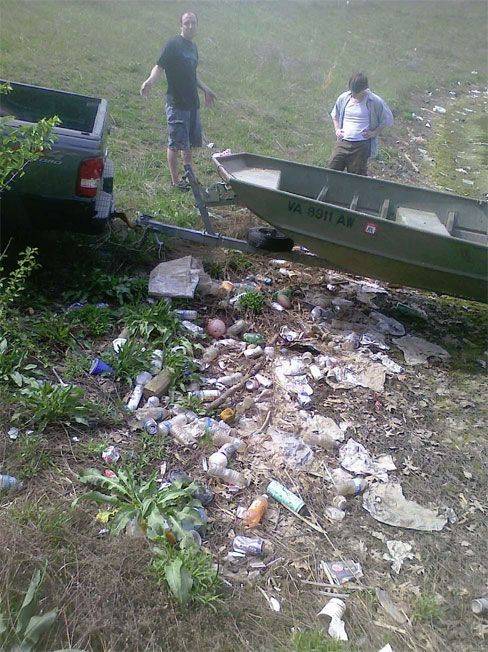
end up in our pond. Creating an unpleasant environment that attracts pest, clogs the
fountain and emits a foul odor.
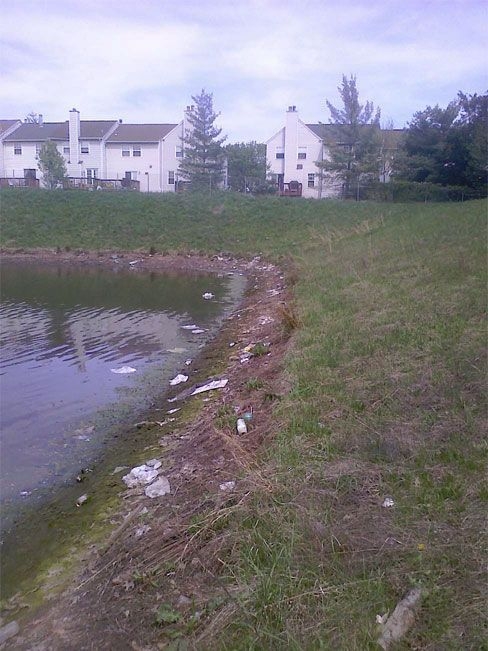
aquatic vegetation are harmed or killed by litter and waste that gets washed into our pond from
our streets.